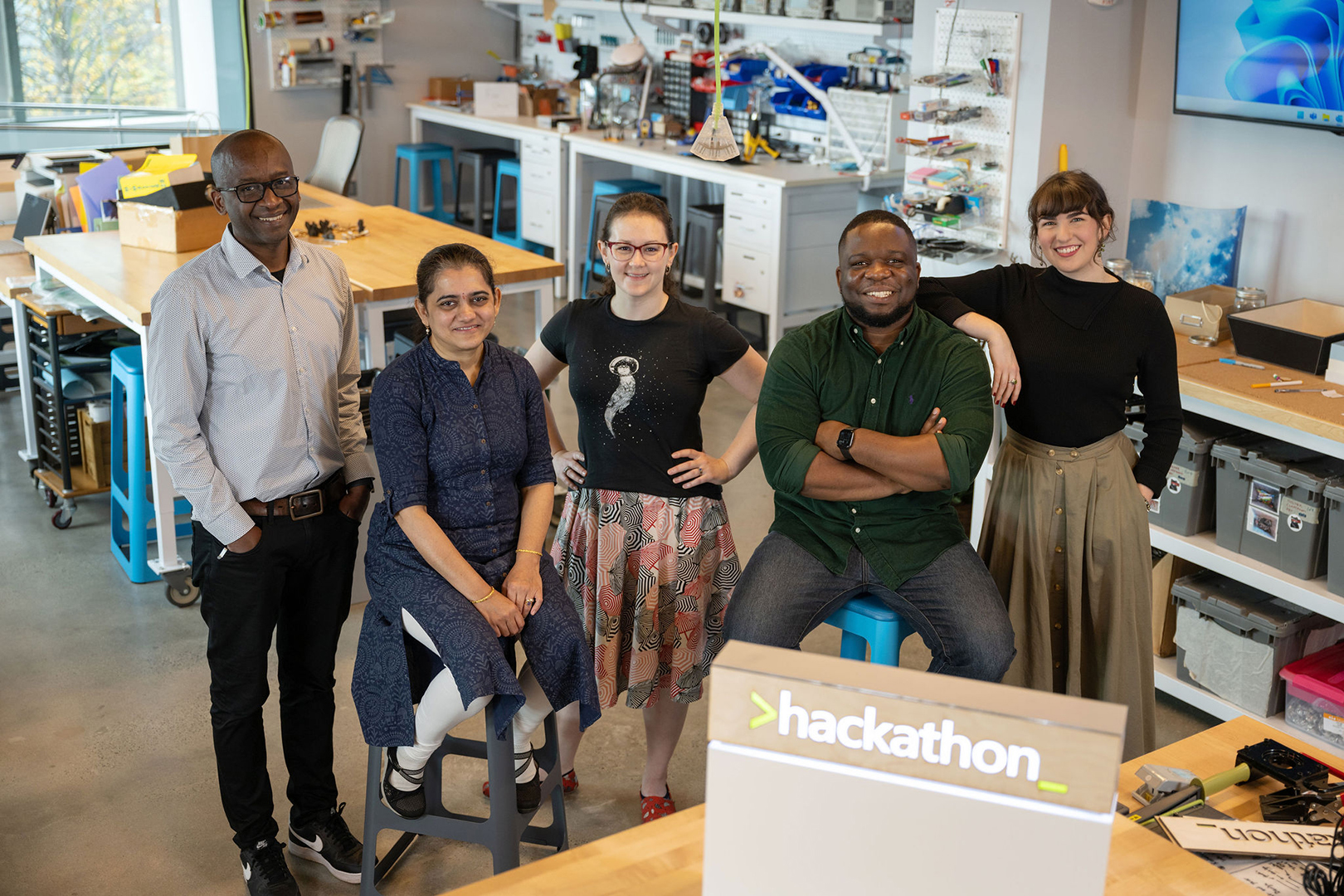Seven strangers from different generations, cultures, jobs and even continents came together with a winning idea for Microsoft’s Global Hackathon when they discovered they’d all had the same experience: spending hours on the phone with a loved one, trying to solve issues on an unseen device without getting frustrated.
“There’s always someone who needs help,” Gracey Wilson says of her tight-knit family that’s spread out along the U.S. East Coast. “My family refers to me and my sister as ‘tech support,’ and they’ll call up and say, ‘Hey, we need tech support,’ and we’ll go, ‘OK, walk me through what you’re trying to do and what you see on the screen.’”
So when Wilson, who helps companies manage security for employees’ devices as a software engineer with Microsoft Intune, found out about coworker Nicole Berdy’s idea for a family tech support app, she was all in. The team she and Berdy gathered came up with a way to help more tech-literate individuals easily provide secure, remote support to more tech-challenged relatives by being given limited access to their devices.
The plan, developed over one week in September, was chosen from more than 10,000 entries competing for the grand prize in the world’s largest private hackathon. More than 68,000 Microsoft employees across 89 countries collaborated this year on projects, many of which will make it into the marketplace either on their own or by influencing other products and services. The family tech-support concept now will get a broader company review, and the team will formally pitch their idea to Chairman and CEO Satya Nadella in coming months. “
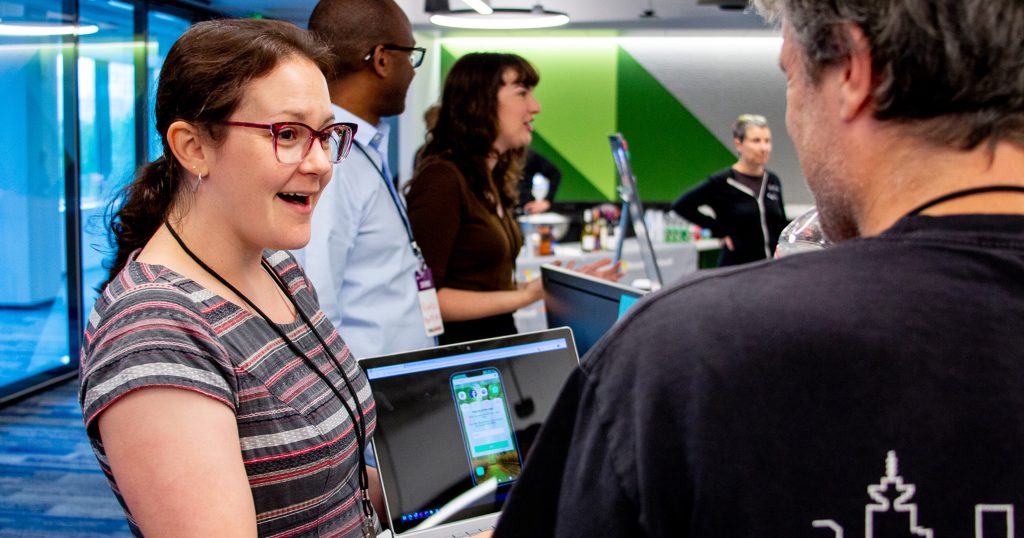
Nicole Berdy, left, Ricardo Monteiro and Gracey Wilson during a science fair at the end of the Global Hackathon week for employees based in Microsoft’s New England Research & Development hub to share their projects with each other (Photo by Jesse Buckley / Cobrandit Video)
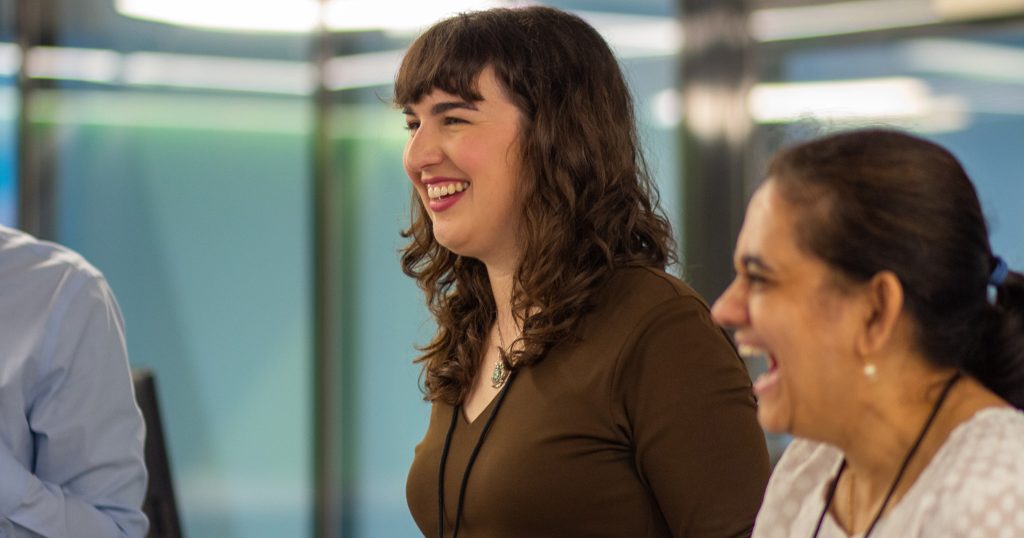
Gracey Wilson and Rajeshwari Godbole during the science fair at the end of the Global Hackathon week in New England (Photo by Jesse Buckley / Cobrandit Video)
Rajeshwari Godbole, a developer for Microsoft’s Nuance Dragon Anywhere dictation app, sees the proposal as “a no-brainer.” Godbole joined Berdy’s Hackathon team as soon as she found out about it — mostly because she needs such a service herself.
When Godbole moved to the U.S. from India, she got smartphones for her parents and in-laws so they could stay in touch more easily. Instead, there was frustration on both sides of the line.
“Whenever I would visit, I would set up the home screen for them with their favorite apps, but then they’d accidentally delete the shortcut, and they’d call me thinking the app was gone and they broke it, or they’d hold the phone with a finger on the volume button and end up putting it on mute and couldn’t hear it ringing anymore, and I just wished I could see the screen to know what was wrong,” Godbole says, recalling one phone call trying to explain when to use a long press or a short tap on an app’s icon.
Godbole wished for something that was the opposite of the parental control apps commonly available.
“With a senior-focused app, you need to restrict less and be able to control without intruding on privacy, giving them the freedom but being able to monitor to quickly fix things for them,” she says. “Everyone I talk to says they need this, whether it’s for their dad, uncle, grandparent, a cousin who isn’t tech-savvy, or an adult autistic child who lives in a residence. There’s a huge market for this kind of help.”
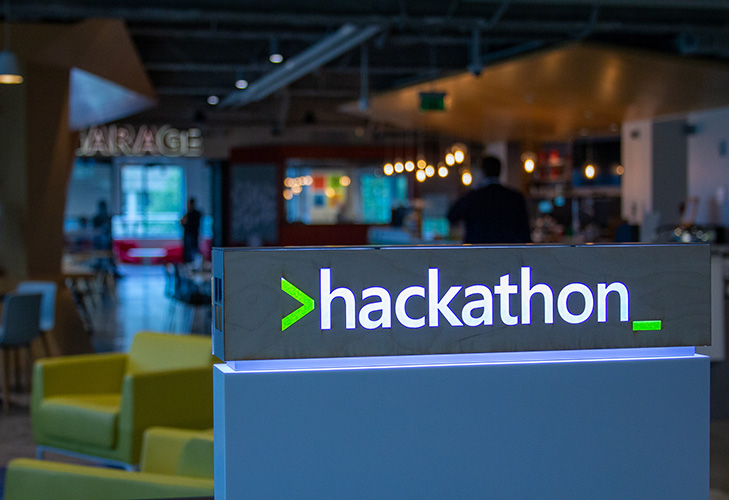
Microsoft’s New England Research & Development hub, or “NERD,” in Cambridge, Massachusetts (Photo by Jesse Buckley / Cobrandit Video)
Nadella started the annual Hackathon shortly after being appointed CEO in 2014 in a push to encourage innovation — often by energizing and emboldening employees to solve problems they see in their personal lives. Winning ideas in the past have led to tech solutions for challenges such as visual impairments, limited mobility, learning disabilities including dyslexia, and more.
The family-support entry was chosen this year because it’s a compassionate idea that builds on Microsoft’s strengths in secure device-management solutions for companies and organizations, making it something the company is “uniquely qualified to deliver,” says Jeff Ramos, who leads the global Microsoft Garage team that runs the Hackathon as part of its mission to promote creativity.
“Sometimes Hackathon projects are all from the same team, and they just see a different way to use what their team does, but this one is interesting because members are from all over the company, coming together for a common purpose,” says Ed Essey, the Garage’s head of intrapreneurship. “They wanted to take our expertise in helping enterprises manage their computers and use it in family situations, so people can help their parents, children and other loved ones have more stable, reliable, secure interactions with their devices.”
Berdy’s idea was born out of personal frustration.
She has family members spread across North and South America, and she and other tech-savvy relatives were called upon during the pandemic to help keep everyone connected through weekly video calls on different types of devices that didn’t always make sense to their users. Berdy, a principal program manager with Microsoft’s Office of the Chief Technology Officer, has years of experience in making Microsoft products more accessible to software developers, but she became increasingly aware of the struggle to make modern tech solutions more manageable for those who aren’t tech-inclined.
As she began building her Hackathon team, she heard stories of go-to family helpers scattered across time zones and stuck in meetings, unable to step away to remotely diagnose and explain to a relative how to fix something. Some commiserated that easily available instructions to common tech problems are usually in English and inaccessible to loved ones who speak a different language, so helping out takes even longer.
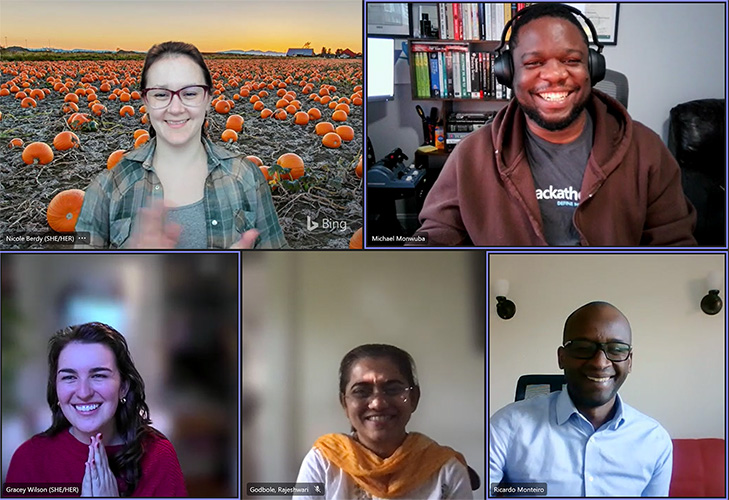
(Top row, left to right) Nicole Berdy and Michael Monwuba, and (bottom row, left to right) Gracey Wilson, Rajeshwari Godbole and Ricardo Monteiro during a Teams call with Microsoft Garage leaders (not pictured are team members Stefan Flegg in Australia and Amr Fadly in Ireland)
They all wished they could just get a ping on their phone requesting help and be able to log in to quickly see and fix the problem, whether it’s something simple like resetting a device’s volume level or more advanced like removing malware. Then they could go about their day knowing they’d helped their loved ones go about theirs, too.
And they all bemoaned the lack of options currently available.
“Every single safety app I’ve seen is marketed specifically for parents with children, but I don’t have kids, and I don’t want to geofence my mom, who is an adult and can go where she wants,” Berdy says. “It’s not about reporting where my family members are or what they’re doing, but about providing tech support. I don’t want to be able to read my mom’s text messages or have her feel like her daughter is spying on her, I just want her to have help when she needs it.”
Berdy works in the Boston area, where Microsoft’s New England Research & Development hub — affectionately acronymed “NERD” — is based and where Chris Templeman runs the NERD Garage at the office in Cambridge’s Kendall Square, one of 14 Garages around the world. She attended a “Clippy’s Coffee Club” event there one day, a weekly gathering hosted by Templeman to connect and share ideas with others. To help Templeman build momentum for the upcoming Hackathon, Berdy wrote several project ideas on notes and pinned them to the idea wall.
Then Wilson saw her idea and convinced her to create an entry on the internal HackBox site, and before long, Berdy was leading an enthusiastic team that hailed from the U.S., Australia and Ireland, with connections to India, Nigeria, Portugal and Egypt.
When Michael Monwuba saw Berdy’s idea, a lightbulb went off: Not only does Monwuba ensure privacy and security standards are adhered to in his position on Microsoft’s Audit team, but he’d also been volunteering in his spare time to help nonprofit organizations configure Intune to help manage their devices. He had figured out ways to keep his two young daughters safe on their tablets at home as well.
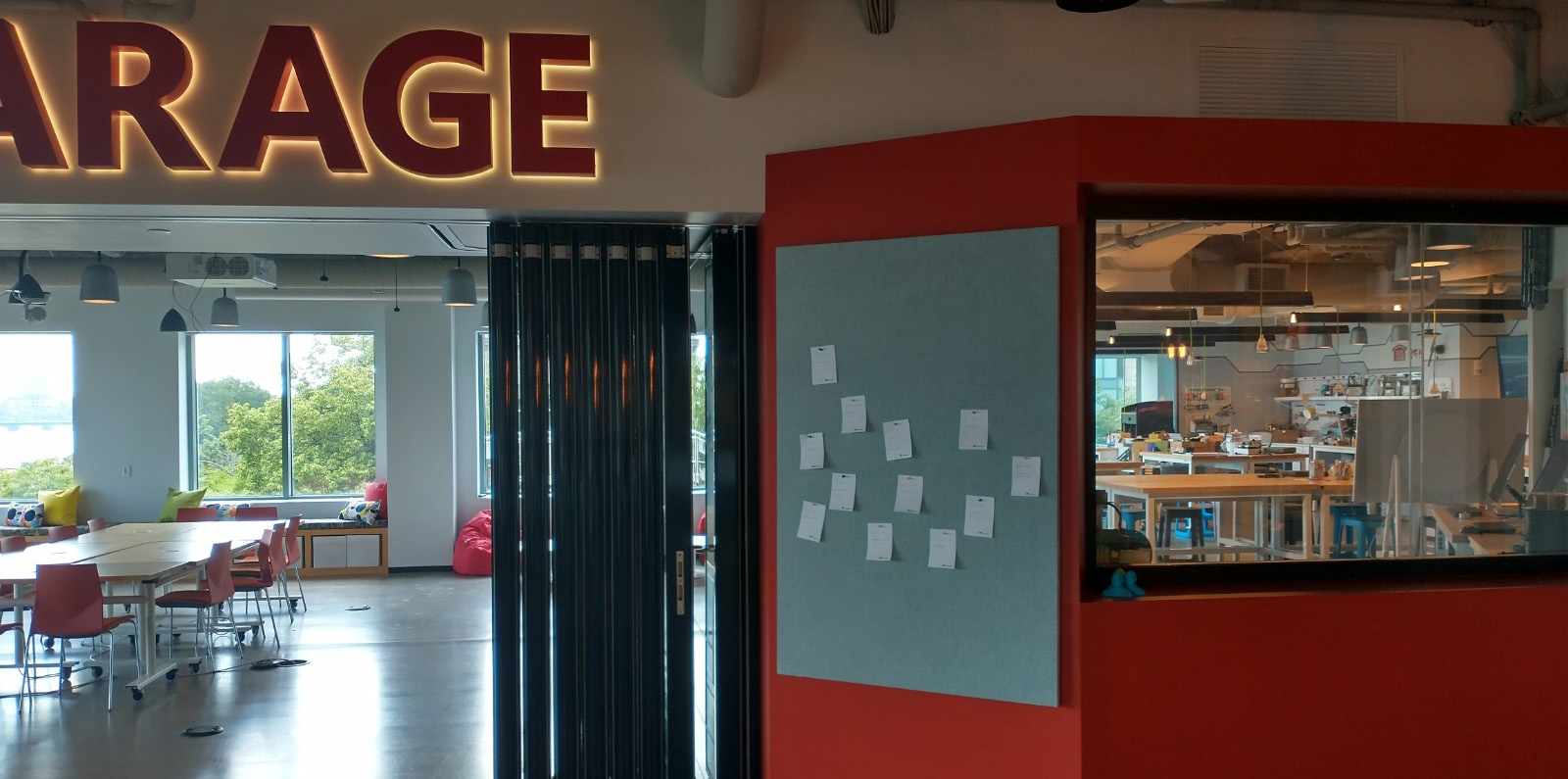
The idea wall outside Clippy’s Café in Microsoft’s New England Research & Development hub (Photo by Jesse Buckley / Cobrandit Video)
“I saw this and thought, this is a brilliant idea,” Monwuba says. “It resonates with what I’m doing already.”
The idea also transported him back 30 years to his introduction to technology, when his father bought a computer but quickly got frustrated with it and locked it in a closet in their Nigerian home. Monwuba crept out of bed one night and started teaching himself how to program it. He has been his father’s tech support ever since — even from across the Atlantic, after moving to the U.S. nearly a decade ago.
“This program is 100% for him and my mom,” Monwuba says. “When my dad has an issue with a device now, we have to wait until I or one of my siblings travel home, or we have to find a neighbor who can help. So that’s why I’m excited about this, because it solves a problem I have.”
Monwuba’s privacy and security auditing background helped the team with a critical component. They came up with a framework that cancels a request for help if it isn’t answered promptly, rather than leaving the connection open. It also allows the device owner to revoke access at any time, in case they’re engaged with something sensitive they don’t want other family members to see.
“I want to help my dad, but working in the security space myself, I know what bad actors can do when given the opportunity and how good intentions can be abused,” Monwuba says. “So security was key.”
The group set up shop in a conference room at the office in Cambridge for everyone who was based in the Boston area and had Microsoft Teams calls running all day with check-ins every morning and evening for teammates in opposite time zones.
“We were pretty much at it for four days straight, which spoke to the enthusiasm we all had,” Wilson says. “What united us is what unites most everyone we know: We love our families, and we want them to have a positive and empowering experience with technology. That’s what we hope this product will bring to the world.”
Sign up for updates at the project website.
Lead photo: (left to right) Ricardo Monteiro, Rajeshwari Godbole, Nicole Berdy, Michael Monwuba and Gracey Wilson at Microsoft’s New England Research & Development hub in Cambridge, Massachusetts (Photo by Christine Hochkeppel)

